Black & Decker 20v Lithium Cordless Leaf Blower Reviews
Many learn almost ancestors, U.S. Black history from family

Pew Inquiry Center conducted this analysis to understand the rich diversity of Blackness people in the Us and their views of Black identity. This in-depth, robust survey explores differences among Blackness Americans in views of identity such as between U.S.-built-in Blackness people and Black immigrants; Black people living in different regions of the land; and betwixt Blackness people of unlike ethnicities, political party affiliations, ages and income levels. The analysis is the latest in the Heart's series of in-depth surveys of public stance among Black Americans (read the first, "Faith Among Blackness Americans").
The online survey of 3,912 Black U.S. adults was conducted Oct. 4-17, 2021. The survey includes 1,025 Black adults on Pew Research Center's American Trends Panel (ATP) and ii,887 Black adults on Ipsos' KnowledgePanel. Respondents on both panels are recruited through national, random sampling of residential addresses.
Recruiting panelists past phone or post ensures that near all U.South. Black adults take a take a chance of selection. This gives us confidence that any sample can stand for the whole population (see our Methods 101 explainer on random sampling). Here are the questions used for the survey of Blackness adults, along with its responses and methodology.
The terms "Black Americans", "Black people" and "Black adults" are used interchangeably throughout this written report to refer to U.S. adults who self-identify as Black, either alone or in combination with other races or Hispanic identity.
Throughout this report, "Black, non-Hispanic" respondents are those who identify equally single-race Black and say they have no Hispanic background. "Blackness Hispanic" respondents are those who identify as Blackness and say they have Hispanic background. Nosotros use the terms "Blackness Hispanic" and "Hispanic Black" interchangeably. "Multiracial" respondents are those who indicate two or more racial backgrounds (one of which is Black) and say they are non Hispanic.
Respondents were asked a question most how important being Black was to how they think about themselves. In this study, we use the terms "being Black" and "Blackness" interchangeably when referencing responses to this question.
In this written report, "immigrant" refers to people who were not U.S. citizens at birth – in other words, those born outside the U.Southward., Puerto Rico or other U.Due south. territories to parents who were not U.S. citizens. We use the terms "immigrant" and "foreign-born" interchangeably.
Throughout this written report, "Democrat and Democratic leaners" refers to respondents who say in they identify politically with the Democratic Party or are independent simply lean toward the Democratic Party. "Republican and Republican leaners" refers to respondents who place politically with the Republican Political party or are independent but lean toward the Republican Party.
To create the upper-, middle- and lower-income tiers, respondents' 2020 family incomes were adjusted for differences in purchasing power by geographic region and household size. Respondents were then placed into income tiers: "Middle income" is defined equally ii-thirds to double the median annual income for the unabridged survey sample. "Lower income" falls beneath that range, and "upper income" lies in a higher place information technology. For more than information well-nigh how the income tiers were created, read the methodology.
No affair where they are from, who they are, their economical circumstances or educational backgrounds, meaning majorities of Black Americans say beingness Black is extremely or very of import to how they think about themselves, with about iii-quarters (76%) overall saying and so.
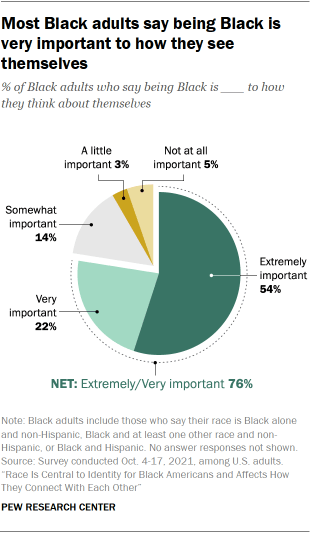
A significant share of Black Americans besides say that when something happens to Black people in their local communities, beyond the nation or around the globe, it affects what happens in their own lives, highlighting a sense of connectedness. Black Americans say this even as they take various experiences and come from an array of backgrounds.
Even so, Black adults who say beingness Black is important to their sense of cocky are more than likely than other Black adults to experience connected to other groups of Black people. They are also more likely to feel that what happens to Black people inside and outside the The states affects what happens in their ain lives. These findings emerge from an all-encompassing new survey of Black U.S. adults conducted by Pew Enquiry Center.
A majority of non-Hispanic Black Americans (78%) say existence Blackness is very or extremely important to how they recall nearly themselves. This racial group is the largest among Black adults, accounting for 87% of the adult population, according to 2019 Census Bureau estimates. But among other Blackness Americans, roughly 6-in-ten multiracial (57%) and Hispanic (58%) Black adults say this.
Black Americans as well differ in key ways in their views nearly the importance of beingness Blackness to personal identity. While majorities of all age groups of Black people say beingness Blackness shapes how they think about themselves, younger Black Americans are less probable to say this – Black adults ages l and older are more than likely than Blackness adults ages 18 to 29 to say that being Black is very or extremely important to how they call up of themselves. Specifically, 76% of Black adults ages thirty to 49, 80% of those 50 to 64 and 83% of those 65 and older hold this view, while only 63% of those under 30 do.
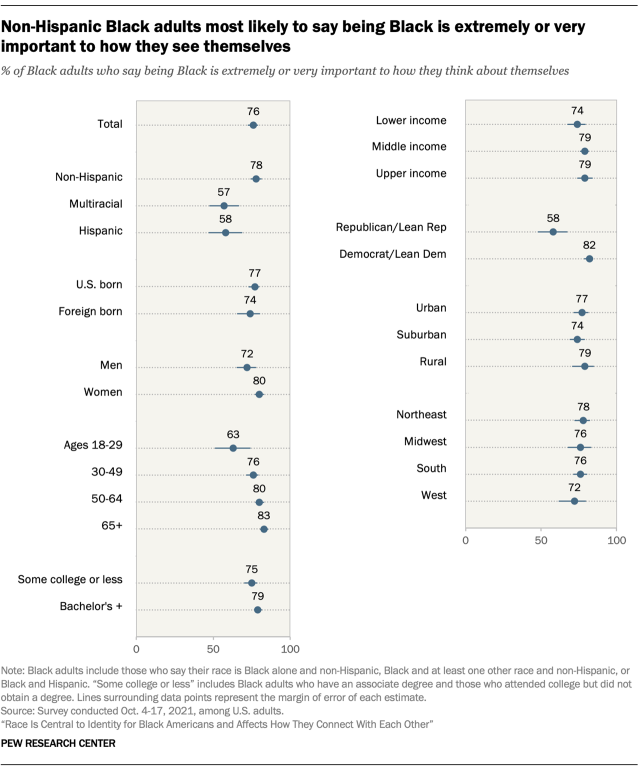
Black adults who identify with or lean toward the Democratic Party are more probable than those who identify with or lean toward the Republican Political party to say being Black is important to how they see themselves – 86% vs. 58%. And Black women (fourscore%) are more probable than Black men (72%) to say existence Black is of import to how they meet themselves.
Still, some subgroups of Black Americans are almost as likely as others to say that beingness Black is very or extremely important to how they think virtually themselves. For example, U.S.-built-in and immigrant Black adults are about as likely to say being Black is important to how they see their identity. Still, not all Blackness Americans experience the aforementioned about the importance of being Black to their identity – 14% say it is only somewhat important to how they see themselves while 9% say it has niggling or no impact on their personal identity, reflecting the diversity of views near identity amongst Black Americans.
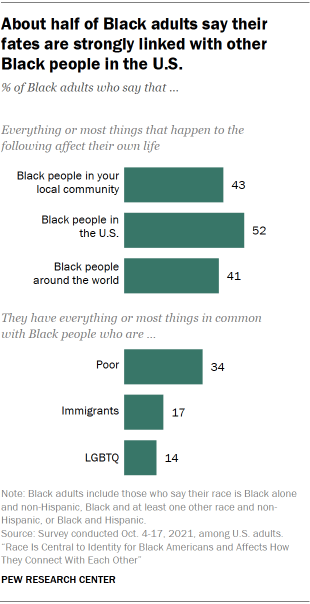
Beyond the personal importance of Blackness – that is, the importance of being Blackness to personal identity – many Blackness Americans feel connected to each other. About five-in-x (52%) say everything or most things that happen to Black people in the United States affect what happens in their ain lives, with another xxx% proverb some things that happen nationally to Blackness people have a personal impact. And 43% say all or most things that happen to Black people in their local community affect what happens in their own lives, while another 35% say merely some things in their lives are affected by these events. Virtually 4-in-10 Black adults in the U.S. (41%) say they feel their fates are strongly linked to Black people effectually the world, with 36% indicating that some things that happen to Black people around the world affect what happens in their ain lives.
The survey too asked respondents how much they have in common with different groups of Black Americans. Some 17% of Black adults say they take everything or virtually things in common with Black people who are immigrants. Merely this sense of commonality differs sharply by nativity: 14% of U.S.-born Blackness adults say they have everything or almost things in common with Black immigrants, while 43% of Blackness immigrants say the same. Conversely, only about ane-in-four Black immigrants (26%) say they have everything or most things in common with U.S.-born Black people, a share that rises to 56% among U.S.-born Black people themselves.
About 1-third of Black Americans (34%) say they have everything or almost things in common with Black people who are poor, though smaller shares say the same nearly Black people who are wealthy (12%). Relatively few Black Americans (14%) say they have everything or most things in common with Black people who identify as lesbian, gay, bisexual, transgender or queer (LGBTQ). However, a larger share of Blackness Americans (25%) say they have at least some things in common with Blackness people who identify as LGBTQ. All these findings highlight the diversity of the U.S. Black population and how much Black people experience connected to each other.
These are among the key findings from a recent Pew Research Center survey of 3,912 Black Americans conducted online Oct. 4-17, 2021. This report is the latest in a series of Pew Research Center studies focused on describing the rich diversity of Black people in the United States.
The nation's Black population stood at 47 1000000 in 2020, making up fourteen% of the U.S. population – up from 13% in 2000. While the vast majority of Black Americans say their racial groundwork is Black solitary (88% in 2020), growing numbers are likewise multiracial or Hispanic. Well-nigh were born in the U.South. and trace their roots back several generations in the state, but a growing share are immigrants (12%) or the U.S.-born children of immigrant parents (nine%). Geographically, while 56% of Black Americans live in the nation'due south South, the national Black population has as well dispersed widely across the country.
It is this diversity – amid U.South.-born Black people and Black immigrants; between Black people who live in unlike regions; and across different ethnicities, party affiliations, ages and income levels – that this written report explores. The survey as well provides a robust opportunity to examine the importance of race to Black Americans' sense of self and their connections to other Blackness people.
The importance of being Black for connections with other Black people
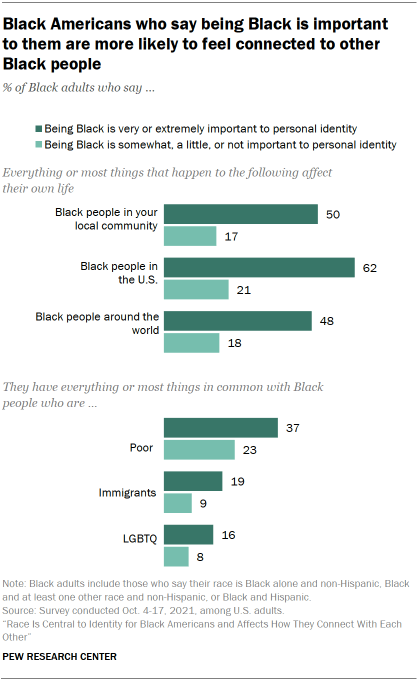
The importance of being Blackness to personal identity is a meaning factor in how connected Black Americans experience toward each other. Those who say that being Black is a very or extremely important part of their personal identity are more than likely than those for whom Blackness is relatively less important to express a sense of common fate with Black people in their local communities (50% vs. 17%), in the United States overall (62% vs. 21%), and fifty-fifty around the globe (48% vs. xviii%).
They are besides more likely to say that they have everything or about things in common with Black people who are poor (37% vs. 23%) and Black immigrants (nineteen% vs. 9%). Even so, fewer than one-half of Black Americans, no matter how important Blackness is to their personal identity, say they take everything or well-nigh things in common with Black people who are poor, immigrants or LGBTQ.
The importance of Black for knowing family history and U.South. Black history
The new survey also explores Black Americans' knowledge near their family histories and the history of Blackness people in the Us, with the importance of Black linked to greater knowledge.
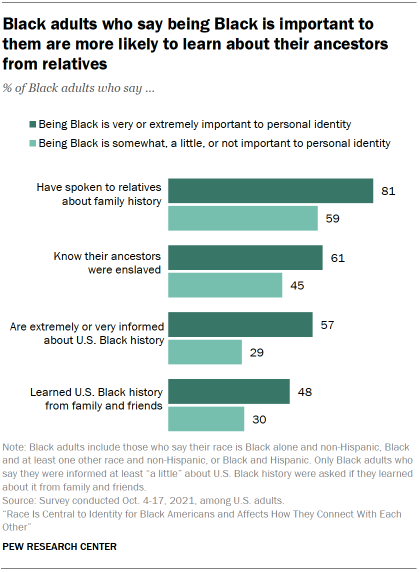
Nearly vi-in-ten Black adults (57%) say their ancestors were enslaved either in the U.S. or another land, with nearly all who say so (52% of the Blackness adults surveyed) saying it was in the U.Due south., either in whole or in part. Black adults who say that being Black is a very or extremely of import function of how they run into themselves (61%) are more than probable than those for whom being Black is less important (45%) to say that their ancestors were enslaved. In fact, Black adults for whom Blackness is very or extremely important (31%) are less likely than their counterparts (42%) to say that they are not sure if their ancestors were enslaved at all.
When information technology comes to learning more about their family unit histories, Black adults for whom Blackness is very or extremely of import (81%) are more than likely than those for whom Black is less important (59%) to accept spoken to their relatives. They are about as likely to accept researched their family unit'southward history online (36% and 30%, respectively) and to have used a mail-in DNA service such as AncestryDNA or 23andMe (15% and 16%) to learn more well-nigh their ancestry.
The importance of Blackness also figures prominently into how informed Blackness Americans feel about U.South. Black history. Black adults who say Black is a significant office of their personal identity are more likely than those for whom Blackness is less important to say that they feel very or extremely informed virtually U.S. Black history (57% vs. 29%). Overall, near one-half of Black Americans say they feel very or extremely informed about the history of Black people in the The states.
Among Black adults who feel at to the lowest degree a petty informed almost U.S. Black history, the sources of their knowledge also differ by the importance of Blackness to personal identity. Nearly one-half of Black adults for whom Blackness is very or extremely important (48%) say they learned about Black history from their families and friends, making them more probable to say so than Black adults for whom Blackness is less important (xxx%). Similarly, those who say being Black is important to their identity are more than likely than those who did not say this to have learned about Black history from nearly every source they were asked about, be information technology media (33% vs. 22%), the net (30% vs. 18%) or college, if they attended (26% vs. 14%). The merely source for which both groups were near equally likely to say they learned about Black history was their K-12 schools (24% and 21%, respectively).
Overall, among Blackness Americans who feel at least a little informed about U.Due south. Black history, 43% say they learned about it from their relatives and friends, 30% say they learned virtually it from the media, 27% from the internet, and 24% from higher (if they attended) and 23% from Yard-12 school.
Younger Black people are less likely to speak to relatives about ancestors
Black adults under 30 years quondam differ significantly from older Blackness adults in their views on the importance of Blackness to their personal identity. However, Black adults also differ past age in how they pursue cognition of family history, how informed they feel about U.Due south. Black history, and their sense of connexion to other Blackness people.
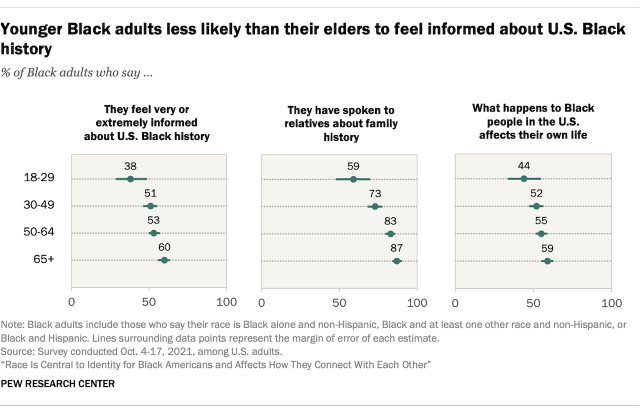
Black adults under 30 (fifty%) are less probable than those 65 and older (64%) to say their ancestors were enslaved. In fact, 40% of Black adults under xxx say that they are non sure whether their ancestors were enslaved. Black adults in the youngest historic period group (59%) are less likely than the oldest (87%) to accept spoken to their relatives most family history or to have used a mail-in Dna service to acquire about their ancestors (11% vs. 21%). They are only slightly less likely to have conducted research on their families online (26% vs. 39%).
Blackness adults under xxx accept the everyman share who say they experience very or extremely informed about the history of Black people in the U.s.a. (40%), compared with 60% of Black adults 65 and older and about half each of Black adults 50 to 64 (53%) and 30 to 49 (51%). In fact, Black adults under xxx are more likely than those 50 and older to say they experience a piffling or not at all informed about Black history. While Black adults are more often than not almost likely to cite family and friends as their source for learning nigh Blackness history, the share nether 30 (38%) who also cite the cyberspace as a source of information is higher than the shares ages 50 to 64 (22%) and 65 and older (14%) who say this.
These historic period differences persist in the sense of connection that Black Americans take with other Black people. Black adults under xxx are less likely than those 65 and older to say that everything or most things that happen to Blackness people in the United states volition bear upon their own lives. This youngest grouping is too less likely than the oldest to take this sense of common fate with Black people in their local customs. One exception to this blueprint occurs when Black adults were asked how much they had in common with Black people who identify as LGBTQ. Blackness adults nether thirty (21%) were considerably more likely than those 65 and older (ten%) to say they take everything or most things in common with Blackness people who identify as LGBTQ.
Black Americans differ past political party on measures of identity and connection
Black Democrats and Republicans differ on how important Blackness is to their personal identities. However, there are also partisan gaps when information technology comes to their connectedness to other Black people.1
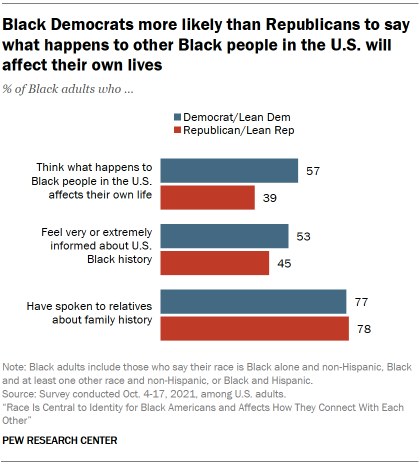
Blackness Democrats and those who lean to the Democratic Party are more probable than Black Republicans and Republican leaners to say that everything or nearly things that happen to Black people in the United states (57% vs. 39%) and their local communities (46% vs. thirty%) affect what happens in their own lives. Nonetheless, Black Republicans (24%) are more likely than Black Democrats (fourteen%) to say that they take everything or most things in common with Black people who are LGBTQ. They are also more than probable than Blackness Democrats to say they have everything or well-nigh things in common with Black people who are wealthy (25% vs. xi%).
When it comes to knowledge of family unit and racial histories, Black Democrats and Republicans do not differ. Democrats (59%) are just as likely as Republicans (54%) to know that their ancestors were enslaved. Nearly 80% of Black adults from both partisan coalitions say they take spoken to their relatives about their family unit history. Similar shares take too researched their family histories online and used postal service-in DNA services.
Black Democrats are also not significantly more probable than Black Republicans to say they feel very or extremely informed about U.Due south. Black history (53% vs. 45%). And amongst those who feel at to the lowest degree a little informed virtually U.Due south. Black history, Democrats and Republicans are about as likely to say they learned it from family and friends (45% vs. 38%).
Place is a key part of Black Americans' personal identities
The majority of Blackness adults who live in the United states of america were born there, only an increasing portion of the population is comprised of immigrants. Of those immigrants, nearly xc% were born in the Caribbean or Africa. Regardless of their region of birth, 58% of Blackness adults say the country they were built-in in is very or extremely important to how they think about themselves. A smaller share say the aforementioned almost the places where they grew upwardly (46%).
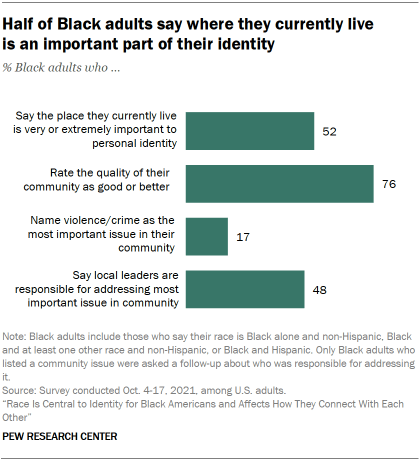
Blackness adults also feel strongly nearly their current communities. Nearly half of Black adults (52%) say that where they currently live is very or extremely important to how they think about themselves. And when information technology comes to the quality of their neighborhoods, 76% of Blackness adults rate them as at to the lowest degree practiced places to live, including 41% who say the quality of their customs is very good or excellent.
Still, Black adults say there are concerning issues in the communities they live in. When asked in an open up-ended question to listing the consequence that was about important in their neighborhoods, nearly one-in-five Black adults listed issues related to violence or criminal offence (17%). Smaller shares listed other points of business such as economic issues like poverty and homelessness (11%), housing (7%), COVID-nineteen and public health (6%), or infrastructure bug such as the availability of public transportation and the conditions of roads (5%).
While nearly one-in-v Black Americans (17%) say that private people like themselves should be responsible for solving these problems, they are near likely to say that local community leaders should address these problems (48%). Smaller shares say the U.S. Congress (12%), the U.Southward. president (viii%) or ceremonious rights organizations (2%) behave responsibleness.
eilermanharme1943.blogspot.com
Source: https://www.pewresearch.org/race-ethnicity/2022/04/14/race-is-central-to-identity-for-black-americans-and-affects-how-they-connect-with-each-other/
Enregistrer un commentaire for "Black & Decker 20v Lithium Cordless Leaf Blower Reviews"